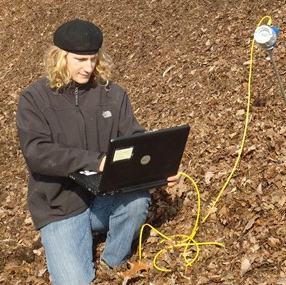Evaluation of mulching materials and limestone rates for management of fusarium wilt of sweet basil
Basil fusarium wilt is a seed-borne disease that can severely reduce basil yields. The biggest concern, however, is that the pathogen can persist in the soil for ten or more years preventing the future use of the land for basil production. The objective of this study was to develop organic control methods that would allow production in infested soil. Several organic mulches, a biocontrol product (Rootshield), and lime applications were examined on soil intentionally infested with fusarium. Basil plants mulched with a composted pine bark had the lowest incidence of fusarium wilt.

 Plant diseases, especially those caused by soil-borne seed infecting pathogens, pose a serious threat to the production of both greenhouse and field crops. Conventional farming operations often use fumigants and chemical seed treatments, which can be harmful to human health and the environment, for controlling seed and seedling pathogens.
Plant diseases, especially those caused by soil-borne seed infecting pathogens, pose a serious threat to the production of both greenhouse and field crops. Conventional farming operations often use fumigants and chemical seed treatments, which can be harmful to human health and the environment, for controlling seed and seedling pathogens.